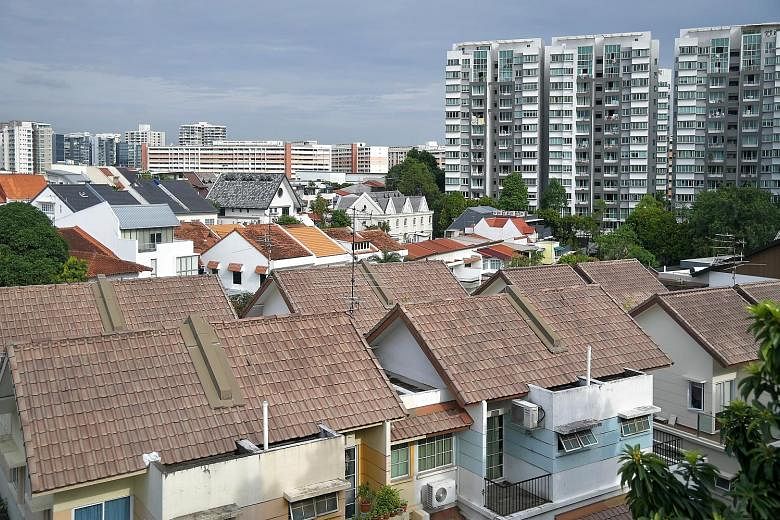A consultation paper that sets out a regulatory framework for short-term accommodation will be released before April - a long-awaited move that could shed light on how home-sharing models like Airbnb can survive here.
National Development Minister Lawrence Wong told The Sunday Times the proposed regulations will be made public by the first quarter of this year, for feedback.
"We want to have a framework to allow short-term home sharing, with the right controls and safeguards. So, we will put out something to allow for this to happen," said Mr Wong.
The public consultation will take place nearly a year after legislators amended the Planning Act to outlaw the type of rental activity that Airbnb facilitates.
Actual legislative changes will occur only after the consultation phase, which means those hoping to share their homes legally have to wait a bit longer.
"It has taken a bit longer than I had expected," said Mr Wong, adding that Singapore's situation is complex due to its high density, and the majority of private home owners live in strata-titled properties.
In those properties, it is not just what one person wants to do, said Mr Wong. "The individual may want to do home sharing, but what about his neighbour? They are a strata owner too and also have a right and a say in this."
Home-sharing platform operators should also be properly regulated, he added.
Commenting on the existing regulations, Airbnb's head of public policy for South-east Asia Mich Goh said it will not be "closing the tap" on the service.
She noted that the current laws governing short-term home sharing and rental in Singapore "are the most restrictive in the world", but said Airbnb remains committed to working with the Government on the matter.
She explained that while some cities, such as Paris and Berlin, have specific laws against home sharing and have fined hosts, none has sought to criminally prosecute them in court for providing stays.
Two Airbnb hosts here were charged last year for allegedly leasing out four units at a private condominium each, in what was the first use of the new law.
The Urban Redevelopment Authority (URA) had previously said that it will examine the specific circumstances of each case before deciding whether to prosecute.
Recalcitrant offenders, those who blatantly disregard the regulations, and those who fail to comply with URA's requirements after enforcement actions, will be charged.
Under the Planning Act, offenders can be fined up to $200,000. Repeat offenders could also face jail.
Existing Airbnb hosts are technically subletting their private homes illegally if the occupants are staying in their homes for less than three months. Subletting Housing Board flats for under six months is also not allowed.
In the light of last year's rule changes and the URA's willingness to criminally prosecute hosts, legal experts have told The Sunday Times that there is no grey area around the law at the moment.
Real estate and finance lawyer at Withers KhattarWong Alex Toh said it is unlikely that the Government will change tack, citing the security and financial accountability concerns created by short-term rentals.
"The current law and regulations may inhibit the growth of the Airbnb model in Singapore, but with a new class of private homes in the works, home owners may wish to consider adopting a wait-and-see approach," said Mr Toh.
A new category of housing, which allows home sharing on a short-term basis, is believed to be one of the ideas in the consultation paper.
Mr Toh suggested that current hosts stick to URA's rules for now and rent only to tenants who seek accommodation for longer than three months.
Proponents of home sharing, however, believe there is still a middle ground for Airbnb hosts to continue short-term leasing.
Dr Costas Courcoubetis, of the Singapore University of Technology and Design, said those who display an "extreme exploitation" of Airbnb's profit-making capabilities that "directly challenges the tolerance of the Government" are most likely to be charged.
"Renters should not abuse their stay and make neighbours upset, causing them to request the URA's intervention. Similarly, apartment owners should not be too greedy and run a hotel business out of their homes.
"With some moderation, the Airbnb model is here to stay," said Dr Courcoubetis.
President of the Sharing Economy Association Singapore Jim Tan described the case as a "setback to the industry".
Airbnb participated in the first public consultation on short-term rentals in 2015, but said the end-result was changes to the Planning Act.
The firm subsequently set up its three-storey Cecil Street regional headquarters in early 2016, which currently houses more than 200 employees.
Airbnb said it did so as it regarded Singapore as a tourism hub that was friendly to innovation and technology, and was encouraged by how Singaporeans responded to other gig economy firms like Uber and Grab.
Said Ms Goh: "It has been a very long time since the first public consultation in 2015, but until now, we still do not know what the next steps are. It is an untenable situation for our community."


